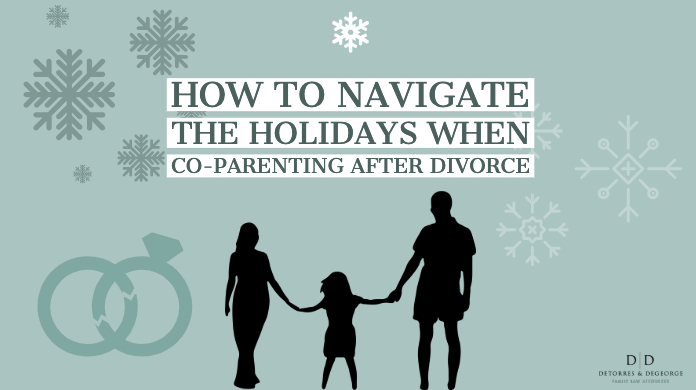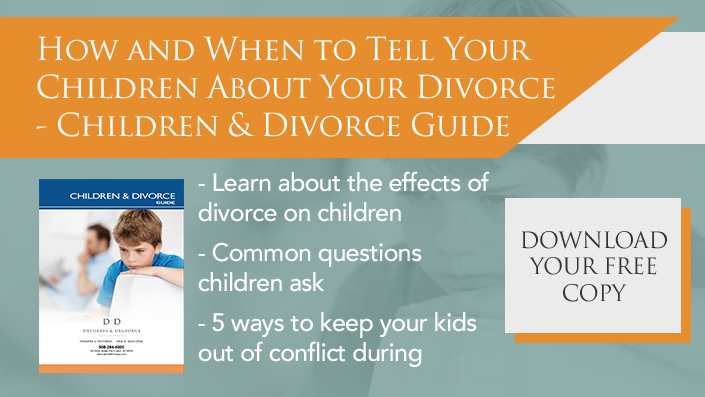 For most divorced families, splitting the holidays is an emotionally wrenching task, especially when an idyllic, picture-perfect holiday season is all you’ve ever dreamed of for your children. Holiday arrangements for divorced parents vary from family to family, but in many instances, the schedule is established and set by the parties involved at the time of the divorce. Most often this includes a division of the holidays—either alternating the holidays each year or perhaps crafting a more specific plan that includes sharing the actual holiday. While it may be difficult for the children to spend a holiday away from one parent or the other, there are things that you can do to try to ease the transition. Here are ways to navigate the holidays when co-parenting after divorce:
For most divorced families, splitting the holidays is an emotionally wrenching task, especially when an idyllic, picture-perfect holiday season is all you’ve ever dreamed of for your children. Holiday arrangements for divorced parents vary from family to family, but in many instances, the schedule is established and set by the parties involved at the time of the divorce. Most often this includes a division of the holidays—either alternating the holidays each year or perhaps crafting a more specific plan that includes sharing the actual holiday. While it may be difficult for the children to spend a holiday away from one parent or the other, there are things that you can do to try to ease the transition. Here are ways to navigate the holidays when co-parenting after divorce:
Co-parent amicably
First, remember that it’s in the children’s best interest that you get along when co-parenting after divorce. This will make everyone’s lives easier as it will reduce conflict all around. You should also encourage your children to spend time with both parents during the holiday season. In truth, you should always encourage the children to have a relationship with the other parent, but it’s especially important during the holidays when emotions are running particularly high. A child who does not see the other parent very frequently may be hesitant to spend the holiday with them, and that will simply lead to more stress and headaches down the line. Also, be sure that you are not disparaging the other parent directly to the children or in situations where the children might be able to hear. While you may not be in a relationship with the other parent any longer, the children continue to love and care for that person, and hearing you speak poorly about them may cause them to become upset—during the holiday season or any time throughout the year.
Figure out the schedule in advance
If you have a set holiday schedule, work with your ex to confirm all the details of your parenting plan during the holiday season, down to the minute. Remember that holiday visitation trumps regular weekly visitation, so the holiday schedule will take over. Get it all planned in advance so there are no last-minute disagreements. Also, be sure to discuss meal timing with your ex. Regular meals prevent cranky kids, so be sure you have a plan that allows young children to stay on a regular schedule.
If you don’t have a set holiday plan, it is best that you work together to schedule separate family events that work for everyone’s schedules. For example, if your soon-to-be ex-husband normally celebrates Christmas Eve with his family, keep in mind that it would be nice for the kids to be able to continue that tradition with their dad. Try to be flexible in your scheduling: If Grandma is only going to be in town on Christmas Day, it would be nice for the children to be able to see her, even if it cuts into your scheduled time. It will forever be in the kids’ best interest to enjoy happy, healthy, and fun holidays with their family.
Consider sharing the holidays together
While this may not be the norm, some divorced couples are so amicable with one another that they are able to continue celebrating big holidays together. Instead of dividing or alternating holidays, some parents instead choose to spend holidays together as a family. One parent may come to the other’s home for Christmas or Hanukkah and spend the day together. They may decide to go to Easter services and brunch together or have Passover together. The whole family might have one party for the child’s birthday.
Sharing holidays can have many benefits when co-parenting after divorce:
- Both parents get to see the child on the actual holiday.
- There are no disputes over transfer times or having equal time.
- Your child’s life is less disrupted.
- Having both parents together may make the child feel very happy.
- You continue to make family memories together.
- You solidify the fact that you are and will always be a family.
This approach does not work for every family. You and your ex must be able to spend time together without fighting or creating tension. One parent must feel comfortable welcoming the other into his or her home. This approach can be very useful for young children in the years immediately after a divorce. As your children get older and as your lives change, you may find that other arrangements suit everyone better. If one of you remarries or has other children, this tradition could become uncomfortable or unworkable.
Coordinate gifts
It is also a good idea to coordinate with your ex in terms of what gifts you will each be getting the children. You don’t want to cause confusion about why Santa brought the exact same gifts to Mom’s house as Dad’s. You also don’t want to be in a situation where one parent rushes out and buys all of the top gifts on the kids’ lists, leaving the other parent to give socks. Some parents chip in together to buy big-ticket items. Try to avoid competing with your ex to give the best gift. Remember that big gifts don’t compensate or change the situation, so showering your child with gifts is not going to solve any problems. If you are able to communicate with your ex, it will go a long way in ensuring that the children have an amazing Christmas.
Set expectations
Make sure your child knows what the plan is, understands that both parents will have time with him or her and that everyone is comfortable and happy with the plan. You don’t want your child to feel guilty or sad about not being with you during the holiday if you can avoid it. You also don’t want them to feel confused or left out. Present your plans cheerfully so that they can feel confident and secure about the holiday plans.
Help your child shop
If you are able to do so, consider helping your child buy a small gift for the other parent. This will make your child feel proud and happy and demonstrate your goodwill toward the other parent. The holidays are more about giving than getting, so you will be teaching your child a valuable lesson. Even if you don’t get along with your ex, helping your child buy him or her a holiday gift is actually a gift for your child.
Surround yourself with family and friends
So often we associate the holidays with joyful family gatherings. But the reality is that divorce changes the entire family dynamic. This may be the first time you’re not with your children on Christmas morning. While you may be comforted in knowing that next Christmas will be your turn if you alternate the sharing of the holidays annually, there’s no question that the first year is particularly hard. So make plans with your family and friends. The last thing you want to do is to sit home alone. Use the time your children are with your ex to travel to see that relative you haven’t celebrated a holiday within years. While you may not be with your children this holiday, you will be with them on others. Take this time to enjoy your extended family and friends.
Take care of yourself
By its very nature, a parenting plan may mean that your child will not be with you during some holidays. With so much to do around the holidays—the baking, the decorating, the shopping—this seems easy enough. Eventually, though, you’re likely to find yourself with some quiet time; and instead of using this time to run around taking care of everyone else, make a point to take some time for yourself. Plan things for yourself with family and friends so you are not alone and lonely on these days. Spend your time doing something that makes you happy, whether it’s going to the gym, buying tickets to the theater, or catching that movie you’ve been dying to see. Make your enjoyment a priority. At the very least, make sure you have some distractions ready and alternate plans. Self-care is extremely important when you are going through a divorce. If you aren’t taking care of yourself, it’s hard to take care of anyone else.
Plan alternate celebrations
If your child is not going to be with you on a big holiday, all is not lost. Plan your celebration for when you will next be together, even if it’s a random Saturday. This can be a very special day that you can both look forward to. You can even start new family traditions that everyone will look forward to each year.
Limit interactions with your ex if need be
If you’re still in the middle of divorce negotiations, keep your interactions light over the holidays, and don’t discuss what has been happening in your case or the financial implications of your divorce. The holiday season is an important time for families, and while your nucleus may not look the same as it once did, as parents you and your ex are still the most significant family members to your children. It’s important to keep in mind when co-parenting after divorce that your children will continue to love both of their parents and will want to enjoy the holidays with everyone.
If you are considering a divorce, contact the attorneys at DeTorres & DeGeorge to schedule a consultation. We’re ready to handle your family law case in New Jersey today.


 START LIVE CHAT
START LIVE CHAT










